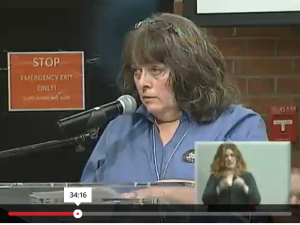This letter was read to JCPS Board Members during the Jan. 26 board meeting.
In yesterday’s blog, Chair Jones says “JCPS can get money in two ways: It can bring in new money or reinvest money it’s been spending.”
Reinvesting needs to be the first step. But reinvesting should not be the shuffling of monies from one school to the other alone. That is not how we will move our district forward. We need to take an honest look at all the dollars that are spent that are not directly impacting student learning and achievement. And the question needs to be asked, “How are those dollars that are spent outside of the classrooms supporting student achievement?”
I would like to request that the Board follow up on a conversation you had at the November 9th meeting. Take a good, honest look at testing in our district. If you are looking for dollars to reinvest in our kids, you need to look at scaling back on unnecessary district tests. We have a copy for each of you listing every test that our students take, broken down by Federal, State and district. Not only are these District tests not mandated, they suck up a lot of district resources, both in money AND valuable instructional time for our students.
Our teachers tell us, “We have to give the diagnostics within the testing window, even if we are behind and haven’t taught it. So, they want the assessments scanned but don’t care about the content being taught. That’s a waste of money and renders that data irrelevant.”
“Our principal has been asking the district to pay for a reading diagnostic (a real one) for our freshmen so we can know on Day 1 who is struggling and where they are. The district wants us to use these diagnostic assessments instead. They tell us NOTHING.”
“The questions have absolutely nothing to do with what we are teaching in the classroom. It’s a complete disconnect for the students.”
“These types of tests are proven to be even more disadvantageous to students in poverty because these students require even more remediation, which comes at the expense of badly needed enrichment and wrap around services At my school, students were forced to consolidate all wrap around services to a single advisory period for 1 hour a week. Those who were not testing well were no longer allowed to participate in programs that were essential to their personal success because the school decided that improving test scores takes precedence over everything else.”
My point is this. There is a big disconnect between what the district wants to see in the data and what we see and do in the classroom. The teachers I’ve talked with would love to give meaningful and relevant assessments; ones that support our mission to actually teach the students how to think and not just pushing information down their throats so we can give them a diagnostic. Data collected this way is the data that is being used to drive this district. The collection method is flawed and therefore so is the data you are using.
Testing is meant to be a support for teaching, not the driver of education. Some testing is needed, but not at the expense of students’ education. Look at our tests this year, invite the teachers into your discussions about relevant assessments because we are the ones working with them all day. We want to help figure out what is working and not working for our students. We want to help be part of the solutions that will allow our students to thrive and not just survive. We cannot do that without you helping us to make changes to the testing policies in our district.
Together, we can do this.

